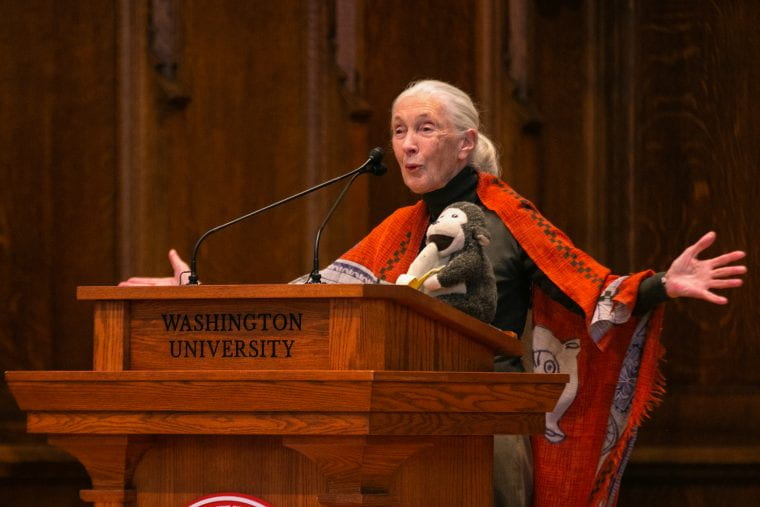Jane Goodall, world-renowned primatologist, anthropologist, and environmental activist, spoke at Graham Chapel last Sunday, Oct. 9, reflecting on defining moments of her career and motivating students to bring positive change to the world throughout their everyday life.
Titled “Inspiring Hope Through Action,” Dr. Goodall’s speech discussed a range of topics spanning from her early interest in animals to her first few months in Gombe, Africa, where she worked under the renowned archaeologist Louis Leakey. Goodall stressed the need for the current generation to embrace the “indomitable spirit” that has helped her achieve what she has accomplished today.
At a time in which little was known about chimpanzees, Goodall took an unconventional approach to her research by completely immersing herself in the chimpanzee habitat in the forest of Gombe. Her discovery that chimpanzees make and use tools for survival altered the way in which human-animal relationships are perceived and revolutionized our understanding of chimpanzees.
After four months of almost zero progress in the forest, “one of the chimpanzees began to lose his fear of me,” Dr. Goodall said as she observed the chimpanzee “break[ing] off a leafy twig, and [using] it as a tool” to acquire termites, in an era when “science believed that humans, and only humans, use and make tools.”
Mentioning her early fascination with animals that was encouraged by her mother, Goodall spoke of the unabating inspiration that her mother provided her with, and how she believes she is the single person most responsible for her success today.
“A different mother might have crushed that early scientific curiosity, and I might not have done what I have done,” Dr. Goodall said.
Receiving funds from an American philanthropist and under the condition that she could not go alone, young Jane set out to Tanzania with her mother, who helped in providing medical care to the locals, in 1960.
“She started a good relationship with all the local people for me…and they accepted me from the beginning because of what she did for them,” Dr. Goodall said.
Following her discovery on the “humanity” of chimpanzees, Goodall was criticized by academics for her work as she did not have a college degree at the time and took an unscientific approach to her work. For instance, she labeled the chimpanzees with names instead of numbers and described them as having personalities and emotions similar to humans.
